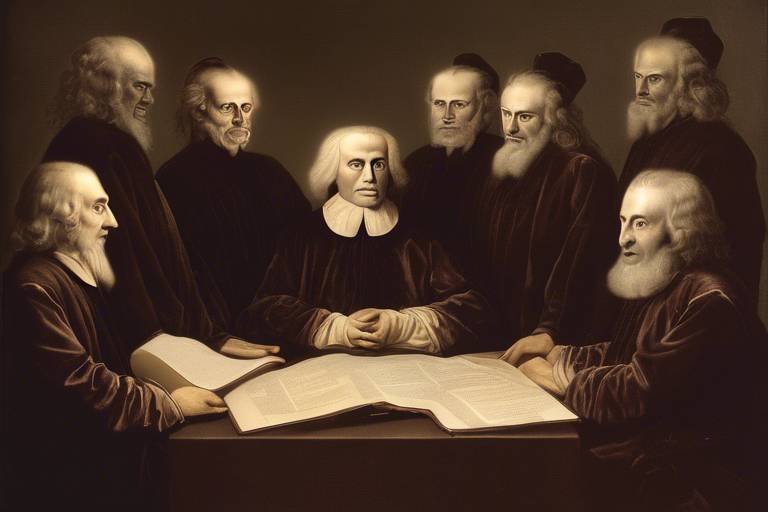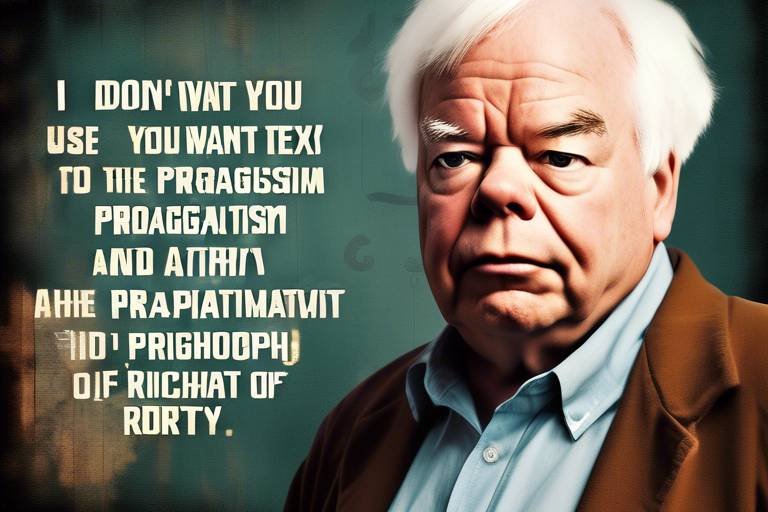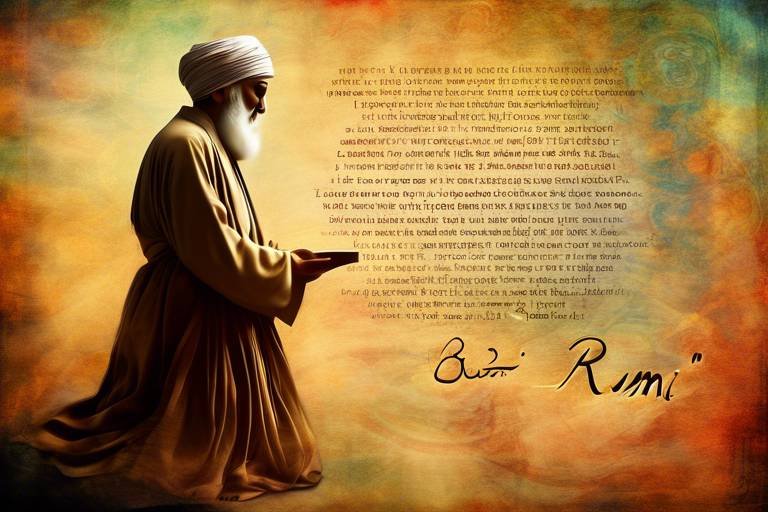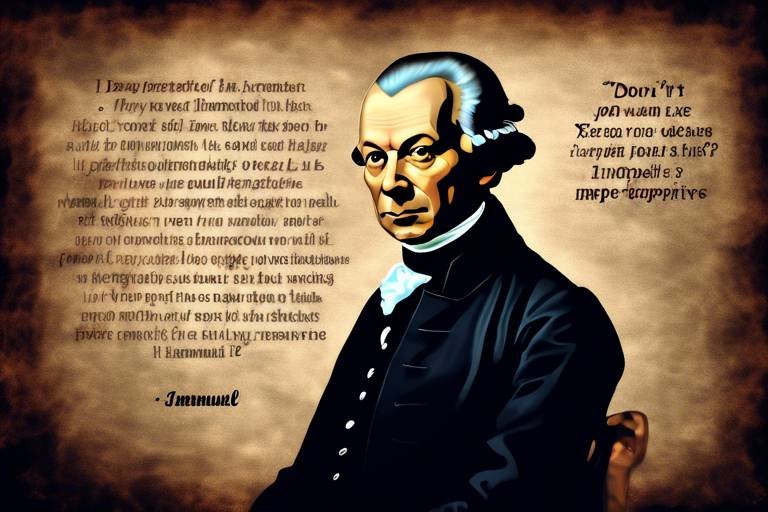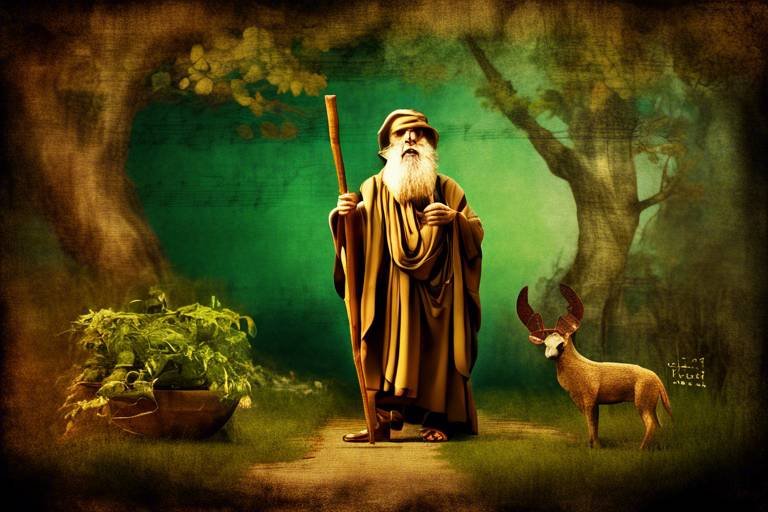Ancient Tragedies and Their Influence on Modern Philosophy
When we think about the profound impact of ancient tragedies on modern philosophy, it's like peering into a vast ocean of human experience and emotion. These timeless narratives, birthed in the heart of ancient Greece, have not only entertained audiences for centuries but have also sparked deep philosophical inquiries that resonate even today. Imagine a world where the struggles of characters like Oedipus or Antigone serve as mirrors reflecting our own ethical dilemmas and existential questions. It's fascinating to consider how these tragic tales have shaped our understanding of life, morality, and the human condition.
At their core, ancient tragedies delve into the complexities of human emotions and the often turbulent relationship between individuals and their fates. They pose questions that are as relevant now as they were thousands of years ago: What does it mean to be truly free? Are we merely pawns in a game of fate, or do we have the power to shape our destinies? The themes of fate, free will, and moral dilemmas that permeate these works continue to fuel philosophical debates, illustrating the timelessness of these narratives.
The influence of ancient tragedies extends far beyond the realm of literature; they have become a foundational element in the study of ethics and existentialism. Think about it: when modern philosophers grapple with questions of morality, justice, and the meaning of life, they often find themselves referencing the very tragedies that have shaped human thought for centuries. The interplay between these ancient stories and contemporary philosophical discourse creates a rich tapestry of ideas that encourages us to reflect on our own lives and choices.
As we explore the intricate connections between ancient tragedies and modern philosophy, we uncover a treasure trove of insights. These narratives challenge us to confront uncomfortable truths about ourselves and the world around us. They invite us to engage in a dialogue that spans generations, urging us to consider not only the characters' struggles but also our own. In this way, ancient tragedies serve as both a cautionary tale and a source of profound wisdom, reminding us of the enduring power of storytelling in shaping our understanding of existence.
- What are ancient tragedies? Ancient tragedies are dramatic works that originated in Greece, exploring themes of human suffering, fate, and moral dilemmas.
- How do ancient tragedies influence modern philosophy? They provide foundational narratives that inform discussions on ethics, free will, and the human condition, shaping philosophical thought.
- Who are key playwrights of ancient tragedies? Notable figures include Sophocles, Euripides, and Aeschylus, whose works continue to be studied and referenced today.
- What themes are prevalent in ancient tragedies? Central themes include fate, hubris, moral dilemmas, and the struggle for identity and meaning.

The Origins of Ancient Tragedy
Ancient tragedy, a captivating blend of art and philosophy, traces its roots back to the vibrant culture of ancient Greece. Initially emerging from religious rituals dedicated to Dionysus, the god of wine, fertility, and festivity, this dramatic form evolved into a profound narrative that explored the depths of human experience. The transformation from simple hymns to complex theatrical performances marked a significant cultural shift, reflecting the values, beliefs, and struggles of the society from which it sprang.
Key figures in this evolution include the legendary playwrights Aeschylus, Sophocles, and Euripides. Each of these authors contributed uniquely to the genre, introducing innovative storytelling techniques and deep philosophical inquiries. Aeschylus is often hailed as the father of tragedy, known for incorporating multiple characters and dialogue, which allowed for richer interactions and dramatic tension. Sophocles further advanced the form by introducing scenery and a third actor, while Euripides brought a more human perspective to the characters, emphasizing their emotional struggles and moral ambiguities.
The cultural significance of ancient tragedy cannot be overstated. These plays were not merely entertainment; they served as a means of exploring critical societal issues such as justice, morality, and the human condition. They acted as a mirror reflecting the complexities of life, prompting audiences to confront their own beliefs and values. The tragedies often depicted the tension between individual desires and societal expectations, a theme that resonates even today.
In ancient Greece, tragedies were performed during festivals, particularly the City Dionysia, where playwrights competed for prestige and recognition. The communal experience of watching these performances fostered a sense of shared identity among the spectators, allowing them to engage in collective reflection on the themes presented. The chorus, an essential element of these plays, provided commentary and insight, guiding the audience through the emotional landscape of the story. This interaction between the performers and the audience created a dynamic atmosphere, making tragedy not just a form of entertainment but a vital part of public discourse.
Moreover, ancient tragedies laid the groundwork for modern philosophical thought. The exploration of profound themes such as fate, morality, and human suffering in these works has influenced countless philosophers throughout history. The questions raised in these narratives continue to challenge and inspire modern thinkers, illustrating the enduring legacy of ancient tragedy.
In summary, the origins of ancient tragedy are deeply intertwined with the cultural and philosophical fabric of ancient Greece. This genre not only entertained but also provoked thought and discussion, shaping the course of Western philosophy and drama. The echoes of these ancient narratives can still be felt in contemporary society, reminding us of the timeless nature of the human experience.

Key Themes in Ancient Tragedy
When we dive into the world of ancient tragedies, we uncover a treasure trove of profound themes that resonate even today. These narratives, steeped in emotion and moral complexity, serve as a mirror reflecting the human experience. One of the most significant themes is fate, which often plays a pivotal role in the characters' lives. Think about it: how many times have you felt that your path was laid out for you, as if invisible hands were steering your decisions? In tragedies like Sophocles' Oedipus Rex, fate is an inescapable force, leading to catastrophic outcomes despite the characters' best efforts to alter their destinies.
Alongside fate, the theme of hubris—excessive pride or self-confidence—emerges as a critical element in these stories. Characters like Agamemnon and Creon often find themselves blinded by their arrogance, leading to their ultimate downfall. This raises a fascinating question: can our own confidence sometimes blind us to the consequences of our actions? The tragic heroes' journeys remind us that overstepping our bounds can have dire repercussions. This theme not only captivates audiences but also serves as a cautionary tale about the dangers of human pride.
Another recurring theme is the struggle with moral dilemmas. These ancient narratives frequently place characters in situations where they must choose between conflicting ethical principles. For instance, in Euripides' Medea, the titular character grapples with her desire for vengeance against her husband, Jason, and the implications of her actions on her children. Such dilemmas force us to confront uncomfortable questions about right and wrong, making us ponder our own moral compasses.
Additionally, the tension between individual desires and societal expectations is a prominent theme in many tragedies. Characters often find themselves torn between their personal ambitions and the duties imposed by society. This conflict is vividly illustrated in plays like Antigone, where Antigone's loyalty to her brother clashes with the laws of the state. This theme invites us to reflect on our own lives: how often do we face the challenge of balancing personal desires with societal norms?
To summarize, the key themes of ancient tragedy—fate, hubris, moral dilemmas, and the clash between individual desires and societal expectations—continue to resonate with modern audiences. They prompt us to reflect on our own lives and the choices we make. These themes not only enrich our understanding of ancient texts but also serve as a foundation for contemporary philosophical inquiries.
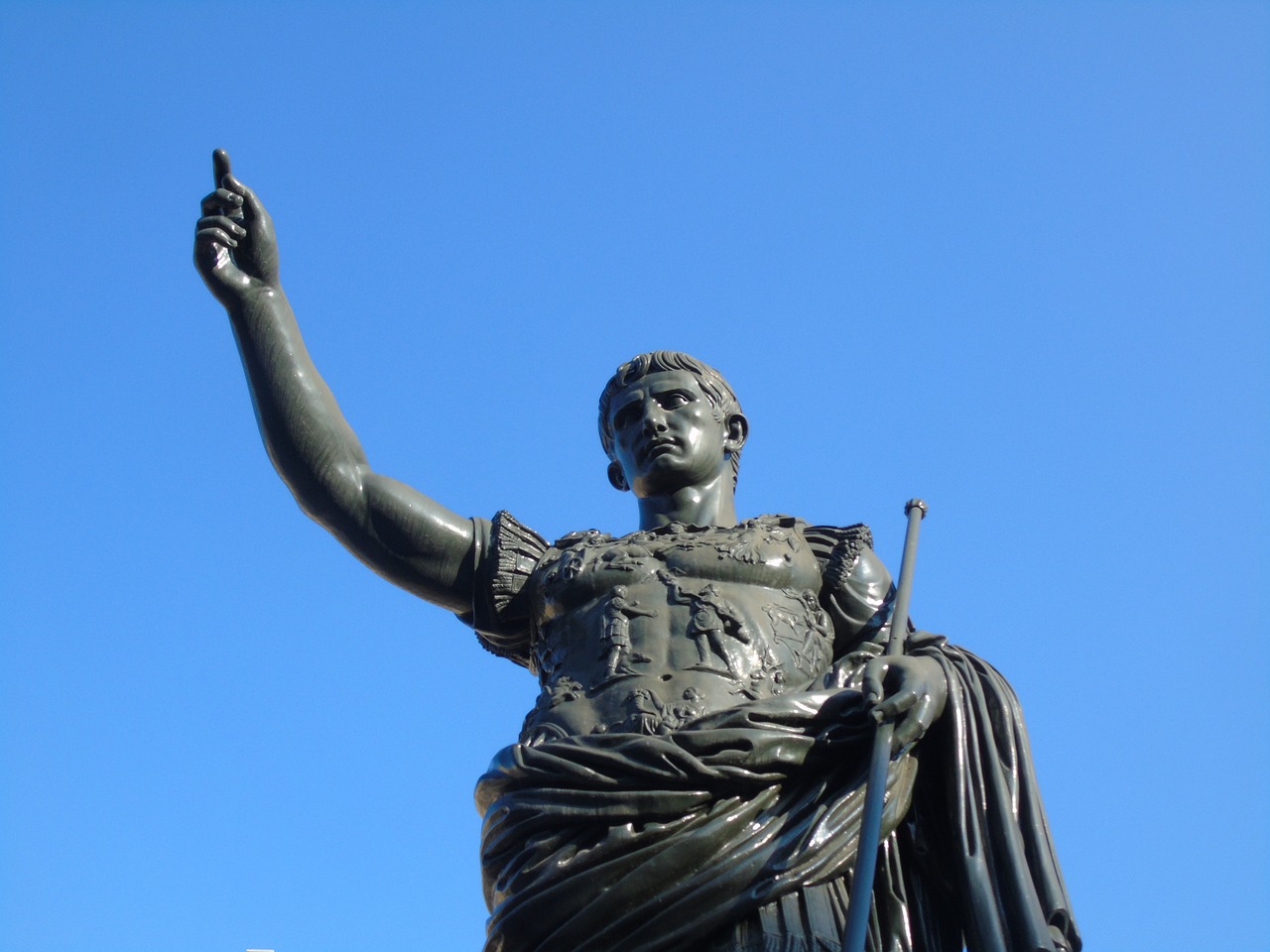
Fate and Free Will
The tension between fate and free will is not just a dramatic device in ancient tragedies; it’s a profound philosophical quandary that has captivated thinkers for centuries. In works like Sophocles' "Oedipus Rex," we see characters grappling with their destinies, often leading to tragic outcomes that seem preordained. This raises an intriguing question: are we merely puppets in a cosmic play, or do we hold the strings of our own lives? This conflict between predetermined fate and the ability to choose has sparked debates that echo through the ages, influencing not only literature but also the foundations of modern philosophical thought.
In ancient Greece, playwrights presented fate as an unavoidable force, often depicted as the will of the gods. Characters like Oedipus, who attempts to escape his prophesied doom, illustrate the futility of resisting fate. Yet, this narrative also invites us to ponder the nature of choice. If Oedipus had made different decisions, would his fate have changed? This question leads us to consider the concept of determinism, which posits that every event, including human actions, is determined by preceding events in accordance with the laws of nature. However, the counterargument, libertarian free will, suggests that individuals possess the power to make choices independent of external constraints.
Throughout history, philosophers have grappled with these ideas. Aristotle, for instance, acknowledged the complexities of fate and free will, suggesting that while certain events might be predetermined, humans still have the capacity for rational thought and ethical decision-making. This duality is crucial in understanding moral responsibility. If our actions are preordained, can we truly be held accountable for them? This question becomes particularly relevant in contemporary discussions about justice and punishment.
Modern interpretations of fate and free will in tragedies can illuminate various contemporary issues. For example, in today’s world, many people feel trapped by societal expectations and systemic structures, mirroring the struggles of ancient characters. The conflict between individual agency and external pressures resonates deeply, making the exploration of fate and free will not just a philosophical exercise but a practical inquiry into our lives. As we navigate our own paths, we might ask ourselves: are we the architects of our destiny, or are we simply following a script written by the universe?
In summary, the interplay of fate and free will in ancient tragedies provides a rich tapestry for philosophical exploration. It challenges us to reflect on our own lives and the choices we make. Are we, like Oedipus, racing towards an inescapable fate, or do we have the power to alter our course? This timeless question continues to inspire debate, reminding us that the struggle for understanding our place in the universe is as relevant today as it was in ancient times.
- What is the significance of fate in ancient tragedies?
Fate often serves as a central theme, illustrating the struggle between predetermined outcomes and human agency. - How do modern philosophers view the concept of free will?
Modern philosophers debate the nature of free will, with some arguing for its existence while others support deterministic views. - Can the themes of ancient tragedies be applied to contemporary issues?
Yes, the themes of fate and free will resonate with current societal challenges, prompting discussions about personal responsibility and choice.

Philosophical Implications
The exploration of fate versus free will in ancient tragedies opens a Pandora's box of philosophical implications that have reverberated through the ages. At the heart of this discourse lies the question: to what extent are we as humans in control of our destinies? In plays such as Oedipus Rex by Sophocles, the protagonist's attempts to escape his foretold fate only lead him deeper into its grasp, illustrating a profound tension between human agency and predetermined outcomes. This dilemma raises critical questions about moral responsibility—if our actions are merely the result of fate, can we truly be held accountable for them?
Throughout history, philosophers have grappled with these questions. For instance, Aristotle posited that while fate might set the stage, it is the choices we make that define our character and moral standing. This notion of moral agency suggests that even within the constraints of fate, individuals possess the power to make ethical decisions. The implications of this perspective challenge us to consider the nature of justice and punishment. If a character in a tragedy is driven by forces beyond their control, can we justify their condemnation? This philosophical inquiry has profound implications for our understanding of ethics in both ancient and modern contexts.
Moreover, modern philosophers like Jean-Paul Sartre have built upon these ancient themes, arguing that existence precedes essence. In this view, individuals are not bound by fate but rather create their own essence through choices. This existentialist lens reframes the tragedy of characters like Oedipus not as a mere victim of fate but as a figure embodying the struggle of human existence. The interplay of fate and free will, therefore, becomes not just a narrative device but a crucial element in understanding human experience itself.
In contemporary discussions, the implications of these ancient tragedies extend into various fields, including psychology and law. For example, the concept of determinism versus free will plays a significant role in legal frameworks surrounding culpability. If individuals are seen as products of their circumstances, the justice system must grapple with the fairness of punishment. This ongoing dialogue illustrates how the philosophical implications of ancient tragedies continue to shape our understanding of morality and justice today, making them not just relics of the past but vital components of modern philosophical inquiry.
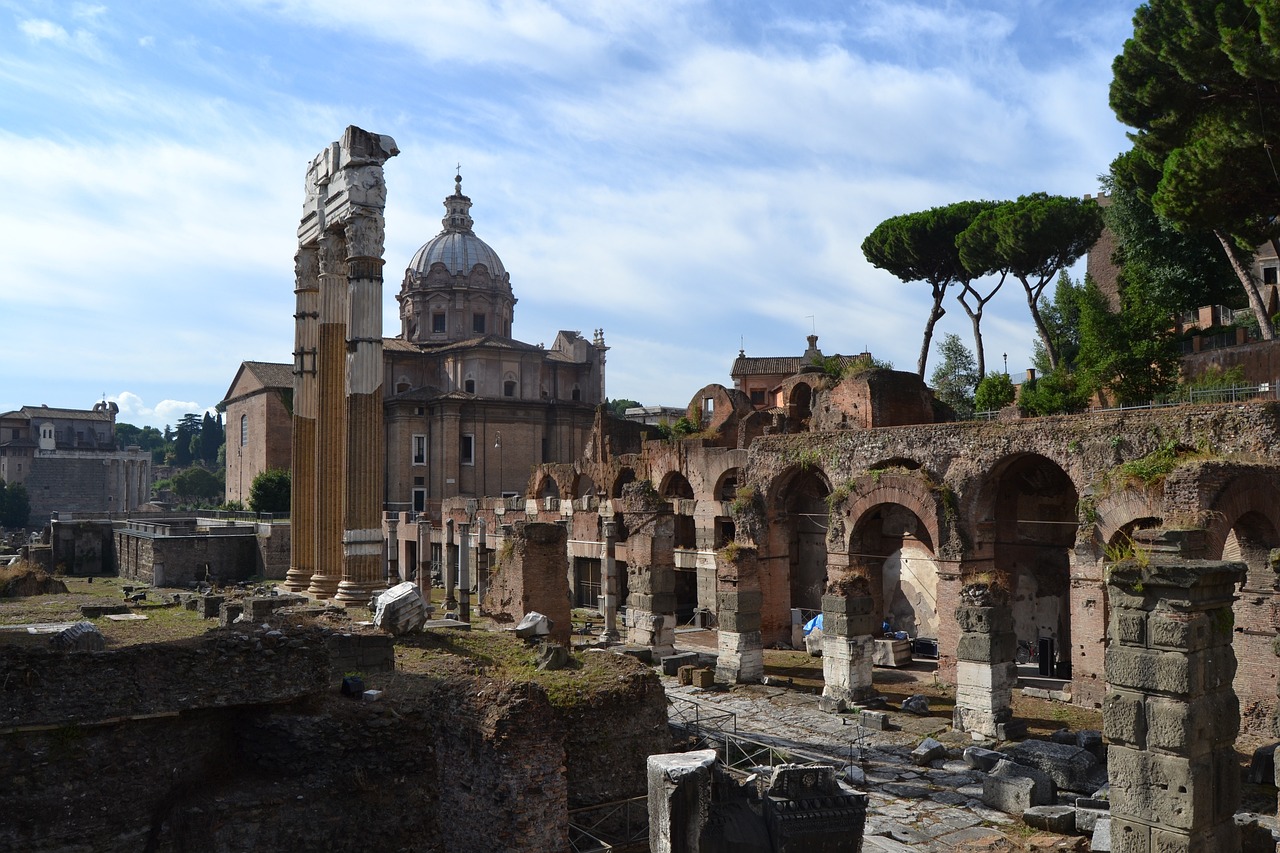
Modern Interpretations
When we think about ancient tragedies, it’s easy to assume that their relevance faded away with the fall of the Roman Empire. However, these narratives have not only survived the test of time but have also found new life in modern interpretations. The themes of fate, free will, and moral dilemmas resonate deeply with contemporary audiences, prompting us to reflect on our own lives and choices. For instance, in today’s world, the struggle between predetermined paths and personal agency is more relevant than ever. With the rise of technology and social media, many people feel trapped by societal expectations, much like the tragic heroes of ancient Greece.
Moreover, modern playwrights and authors often draw inspiration from these ancient works, reimagining them to address current societal issues. Consider the way Shakespeare incorporated elements of Greek tragedy into his plays, or how contemporary adaptations of Antigone tackle themes of civil disobedience and individual rights. These reinterpretations not only breathe new life into the original texts but also challenge us to engage with the underlying philosophical questions they pose.
Another fascinating aspect of modern interpretations is the way they utilize different mediums. Films, novels, and even video games have taken cues from ancient tragedies, exploring the same ethical quandaries and existential struggles. For example, movies like Dead Poets Society and Black Swan echo the tragic flaws and moral dilemmas faced by their characters, reminding us that the essence of tragedy is timeless. The emotional weight of these stories allows us to confront our own fears and uncertainties, bridging the gap between ancient and modern thought.
Furthermore, the concept of tragedy has evolved in the context of modern philosophy. Philosophers like Albert Camus and Jean-Paul Sartre have used the tragic narratives of ancient Greece to articulate their ideas about the absurdity of life and the search for meaning. They argue that just as the characters in these tragedies grapple with their fate, we too must navigate a world that often seems chaotic and indifferent. This connection between ancient and modern thought highlights the enduring impact of tragedy on our understanding of the human condition.
In summary, modern interpretations of ancient tragedies serve as a powerful reminder that these stories are not relics of the past but living texts that continue to shape our philosophical discourse. They challenge us to confront our own moral dilemmas and existential questions, ensuring that the legacy of ancient tragedy remains relevant in today’s world.
- How do ancient tragedies influence modern literature? Ancient tragedies have inspired countless modern authors, leading to the creation of works that explore similar themes of fate, morality, and human suffering.
- What are some examples of modern adaptations of ancient tragedies? Examples include contemporary plays, films, and novels that reimagine Greek tragedies to reflect current societal issues, such as Antigone and Oedipus Rex.
- Why are the themes of ancient tragedies still relevant today? Themes like fate, free will, and moral dilemmas resonate with modern audiences as they grapple with their own choices and the complexities of life.

Moral Dilemmas in Tragedy
Ancient tragedies are often a vivid tapestry woven with the threads of complex moral dilemmas. These dilemmas not only challenge the characters within the narratives but also serve as a mirror reflecting our own ethical beliefs and struggles. Imagine being faced with a decision that could lead to the downfall of a loved one or the destruction of an entire city. This is the essence of tragedy—characters are thrust into situations where their choices carry heavy consequences, and their moral compasses are put to the ultimate test.
Take, for instance, the plight of Antigone, who must choose between obeying the law of the land and honoring her deceased brother. Her unwavering commitment to familial duty over civic duty raises profound questions about loyalty, justice, and the price of moral integrity. This tension between personal ethics and societal expectations is a recurring theme in tragedies, prompting audiences to grapple with their own values. Are we, like Antigone, willing to sacrifice everything for our beliefs, or do we bend to the pressures of society?
Moreover, these moral quandaries are not merely abstract concepts; they resonate deeply with modern audiences. Consider the following dilemmas that echo throughout various ancient tragedies:
- Is it justifiable to take a life in the name of justice?
- How do we weigh the importance of personal happiness against the greater good?
- What happens when the law conflicts with our moral convictions?
These questions are not just relics of ancient thought; they are the very foundation of contemporary philosophical discussions. Philosophers today continue to explore these issues, drawing parallels between the moral conflicts faced by tragic heroes and the ethical dilemmas we encounter in our own lives. The tragic narrative becomes a platform for examining the nuances of morality, urging us to reflect on our choices and their implications.
Furthermore, the emotional weight of these dilemmas often leads to a cathartic experience for the audience. As we witness the struggles of characters like Oedipus, who must confront the horrific consequences of his actions, we are invited to ponder our own moral frameworks. The empathy we feel for these characters allows us to engage with the ethical questions they face, ultimately enriching our understanding of morality itself.
In conclusion, the moral dilemmas presented in ancient tragedies are more than just plot devices; they are essential to the philosophical discourse that continues to shape our understanding of ethics today. By examining these timeless conflicts, we not only gain insight into the human condition but also find ourselves challenged to consider what we would do in similar situations. As we navigate our own lives, the lessons learned from these ancient tales remain as relevant as ever, pushing us to question our own values and the moral choices we face.
- What are moral dilemmas in ancient tragedies?
Moral dilemmas in ancient tragedies are complex ethical conflicts faced by characters, often involving difficult choices that have significant consequences. - How do these dilemmas relate to modern philosophy?
These dilemmas resonate with contemporary philosophical discussions by challenging our understanding of ethics, justice, and personal responsibility. - Can modern audiences relate to ancient tragedies?
Yes, the moral conflicts presented in ancient tragedies are timeless and continue to provoke thought and empathy in modern audiences.
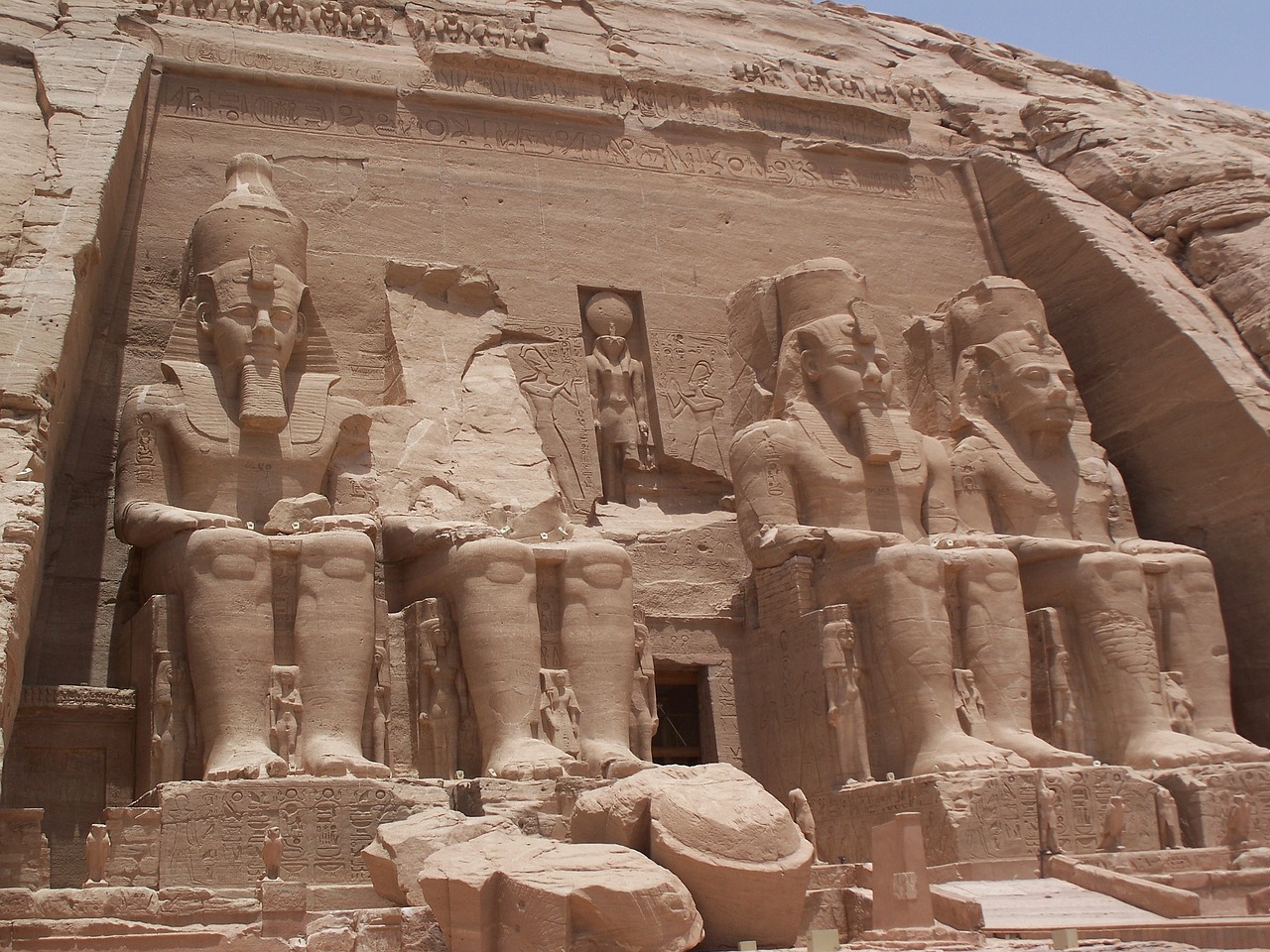
Influence on Modern Philosophers
Throughout history, the profound narratives and intricate character arcs found in ancient tragedies have left an indelible mark on modern philosophical thought. Think about it: how many times have we encountered the struggles of characters like Oedipus or Antigone and felt a deep resonance with their plights? These ancient stories are not merely relics of the past; they are living dialogues that continue to shape our understanding of ethics, existence, and human behavior. The influence of ancient tragedy can be seen in the works of several key philosophers who have drawn inspiration from these timeless narratives, weaving them into the fabric of contemporary philosophical discourse.
One of the most notable figures in this regard is Friedrich Nietzsche, whose concept of the "Übermensch" and the eternal recurrence echoes the tragic heroes of Greek drama. Nietzsche believed that embracing the chaos of existence, much like the tragic figures who confront their fates, allows individuals to transcend traditional moral constraints. This perspective aligns with the existentialist view that life is inherently absurd, a theme prevalent in the works of playwrights like Sophocles and Euripides.
Moreover, modern philosophers such as Jean-Paul Sartre and Simone de Beauvoir have also engaged with the themes of ancient tragedy to explore the human condition. Sartre's existentialism is deeply intertwined with the idea of choice and responsibility, concepts that resonate with the moral dilemmas faced by tragic heroes. For instance, in tragedies where characters are forced to make impossible choices, we see a reflection of Sartre's assertion that "existence precedes essence," emphasizing the weight of human freedom and the burden of decision-making.
To illustrate this influence further, let's take a look at a table that highlights some key philosophers and their connections to ancient tragedies:
| Philosopher | Connection to Ancient Tragedy | Key Themes |
|---|---|---|
| Friedrich Nietzsche | Embraces chaos and tragedy as essential to life | Übermensch, eternal recurrence |
| Jean-Paul Sartre | Explores freedom and moral responsibility | Existentialism, choice |
| Simone de Beauvoir | Analyzes ethics through tragic dilemmas | Feminism, ethics of ambiguity |
Additionally, the ethical questions posed in ancient tragedies have sparked discussions among contemporary philosophers regarding justice and human behavior. For example, the moral conflicts faced by characters like Antigone, who defies state law to uphold familial loyalty, resonate in today's debates about civil disobedience and moral obligation. This interplay between ancient narratives and modern ethical considerations illustrates how deeply intertwined our philosophical inquiries are with the tragedies of the past.
In essence, ancient tragedies serve as a rich source of inspiration for modern philosophers, providing a lens through which we can examine the complexities of human existence. The questions raised by these narratives—about fate, morality, and the human condition—continue to challenge and inspire thinkers today. As we delve deeper into these themes, we uncover not just the stories of ancient heroes, but also the timeless struggles that define our very nature as human beings.
- How have ancient tragedies influenced modern ethical theories? Ancient tragedies present complex moral dilemmas that challenge characters' ethical beliefs, which modern philosophers analyze to discuss contemporary moral issues.
- Which philosophers are most influenced by ancient tragedies? Key figures include Friedrich Nietzsche, Jean-Paul Sartre, and Simone de Beauvoir, all of whom engage with themes of fate, morality, and human existence.
- What are some key themes in ancient tragedies that resonate today? Themes such as fate versus free will, moral dilemmas, and human suffering continue to be relevant in modern philosophical discussions.
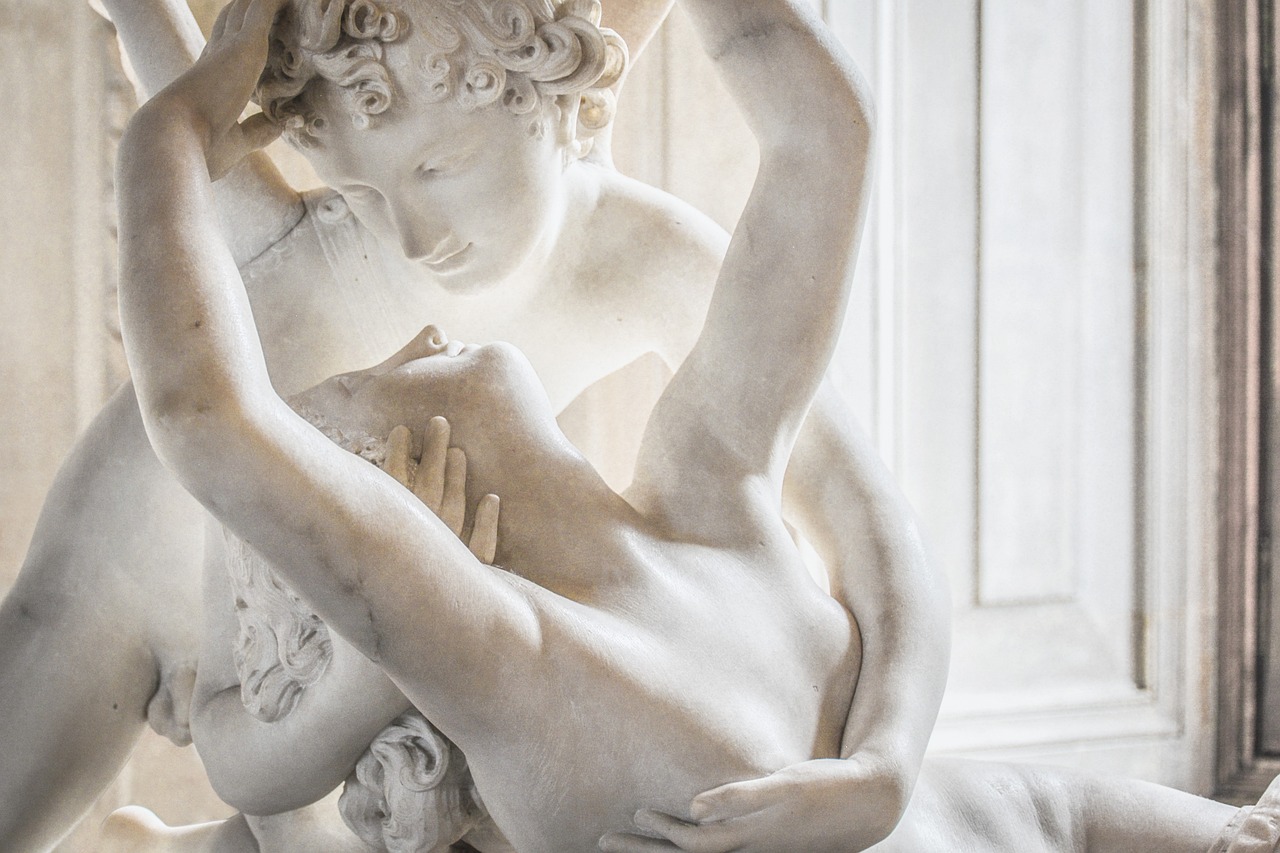
Existentialism and Tragedy
Existentialism, a philosophical movement that gained prominence in the 20th century, finds its roots deeply entwined with the narratives and themes present in ancient tragedies. These tragic tales, often steeped in human suffering and absurdity, resonate profoundly with existentialist thinkers who grapple with the nature of existence. Just think about it—what better way to explore the human condition than through the lens of characters who face insurmountable odds, moral quandaries, and the inevitable specter of death? Ancient tragedies such as those penned by Sophocles and Euripides serve as a backdrop for existentialist ideas, illustrating the struggle for meaning in a seemingly indifferent universe.
One of the key aspects of existentialism is the acknowledgment of absurdity. The characters in ancient tragedies often confront situations that are not only tragic but also absurd, reflecting the existential belief that life can be chaotic and devoid of inherent meaning. For instance, consider the plight of Oedipus—a man doomed by fate to fulfill a prophecy he desperately tries to escape. His journey encapsulates the existential struggle against a predetermined fate, raising questions about free will and the extent of human agency. In this light, Oedipus becomes more than just a tragic hero; he embodies the existential crisis that many individuals face when confronted with the unpredictable nature of life.
Moreover, existentialist philosophers like Jean-Paul Sartre and Albert Camus have often drawn parallels between their ideas and the themes explored in ancient tragedies. Sartre's notion of "existence precedes essence" echoes the experiences of tragic characters who must create their own meaning in a world that often seems devoid of it. Similarly, Camus’ concept of the absurd hero, exemplified by Sisyphus, mirrors the struggles of tragic figures who persist in the face of insurmountable challenges. This connection between existentialism and ancient tragedy allows for a rich dialogue about the human condition, morality, and the search for meaning.
To illustrate this connection further, let’s consider some key themes shared between existentialist thought and ancient tragedies:
| Theme | Existentialist Interpretation | Tragic Example |
|---|---|---|
| Absurdity | Life lacks inherent meaning; individuals must create their own. | Oedipus' futile attempts to escape fate. |
| Free Will | Human beings are condemned to be free and must navigate their choices. | Antigone’s defiance against societal laws. |
| Moral Responsibility | Individuals must bear the weight of their choices. | Creon’s tragic downfall due to his decisions. |
In conclusion, the interplay between existentialism and ancient tragedy reveals profound insights into the human experience. These narratives not only reflect the struggles of their time but also continue to resonate with modern audiences who grapple with similar questions of existence, morality, and the search for meaning. As we delve deeper into the tragic tales of the past, we uncover the timeless nature of these philosophical inquiries that remain relevant in our contemporary discourse.
- What is existentialism? Existentialism is a philosophical movement that emphasizes individual existence, freedom, and choice, often confronting the absurdity of life.
- How do ancient tragedies relate to existentialism? Ancient tragedies explore themes of fate, free will, and moral dilemmas that align closely with existentialist thought.
- Who are some key figures in existentialism? Notable existentialist philosophers include Jean-Paul Sartre, Albert Camus, and Simone de Beauvoir.
- Can you give an example of a tragic hero in ancient literature? Oedipus from Sophocles' play is a classic example of a tragic hero who grapples with fate and free will.

Ethics and Tragedy
When we dive into the world of ancient tragedies, we quickly realize that they are not just stories of woe and despair; they are profound explorations of ethical dilemmas that resonate through time. Each character faces choices that force them to grapple with their morals, often leading to catastrophic consequences. Think about it: how many times have you found yourself in a situation where the right choice was clouded by emotions, societal expectations, or even personal desires? Ancient tragedies amplify these struggles, presenting them in a way that is both relatable and thought-provoking.
Take, for instance, the tale of Oedipus Rex by Sophocles. Here, Oedipus embodies the struggle between personal responsibility and fate. He is determined to uncover the truth about his origins, yet this pursuit leads him to fulfill a prophecy he desperately tried to avoid. This tension sparks a critical question: Are we truly in control of our actions, or are we merely pawns in a larger game dictated by fate? This question has echoed through the ages, influencing countless philosophical debates about free will and moral responsibility.
Furthermore, ancient tragedies often depict characters who must make impossible choices, illuminating the complexities of ethical decision-making. For example, in Euripides' Hippolytus, Phaedra is torn between her forbidden love for Hippolytus and her loyalty to her husband, Theseus. Her ultimate choice leads to devastating consequences, raising the ethical question of whether our desires can ever justify our actions. This scenario reflects the modern struggle with ethical relativism, where the lines between right and wrong become increasingly blurred.
In exploring these moral quandaries, ancient tragedies serve as a mirror reflecting our own ethical challenges. They compel us to confront uncomfortable truths about human nature and the consequences of our choices. The characters’ fates often serve as cautionary tales, reminding us that ethical decisions are rarely black and white. Instead, they exist in a complex web of motivations, societal pressures, and personal convictions.
Moreover, the influence of these ancient narratives extends beyond literature into modern philosophical discourse. Thinkers like Immanuel Kant and Friedrich Nietzsche have drawn upon the ethical implications presented in tragedies to develop their own theories on morality and justice. Kant’s categorical imperative, which emphasizes duty and universal moral laws, can be seen as a response to the moral chaos depicted in these ancient texts. On the other hand, Nietzsche’s exploration of morality challenges the very foundations of ethical thought, suggesting that traditional values may be inherently flawed. In this way, ancient tragedies not only entertain but also stimulate critical philosophical inquiry.
As we navigate our own lives, the ethical dilemmas presented in ancient tragedies continue to resonate. They remind us that our decisions have consequences, and that the struggle for moral clarity is a timeless human experience. In a world where ethical challenges are ever-present, these narratives encourage us to reflect on our values and the impact of our choices. They ask us to consider: What kind of person do we want to be? and How do our actions define us? Ultimately, the exploration of ethics in tragedy reveals that while our circumstances may differ, the human condition remains strikingly similar across the ages.
- What is the significance of ethics in ancient tragedies?
Ancient tragedies explore complex ethical dilemmas that challenge characters' moral beliefs, reflecting the timeless nature of human struggles with right and wrong. - How do modern philosophers relate to ancient tragedies?
Many modern philosophers draw inspiration from ancient tragedies to discuss ethical questions, free will, and moral responsibility, shaping contemporary philosophical discourse. - Can ancient tragedies teach us about modern ethical issues?
Yes, the moral dilemmas presented in ancient tragedies often parallel modern ethical challenges, encouraging reflection on our values and decision-making processes.
Frequently Asked Questions
- What are the main themes found in ancient tragedies?
Ancient tragedies often explore profound themes such as fate, hubris, and moral dilemmas. These themes resonate deeply with modern philosophical inquiries, as they raise questions about human existence, ethical behavior, and the nature of destiny.
- How does the concept of fate versus free will appear in ancient tragedies?
The conflict between fate and free will is a central motif in many ancient tragedies. Characters frequently grapple with their destinies, leading to philosophical debates about determinism and human agency. This tension has influenced thinkers throughout history, prompting discussions about moral responsibility.
- In what ways do ancient tragedies influence modern philosophy?
Many modern philosophers draw inspiration from ancient tragedies to explore themes of existentialism, ethics, and the human condition. These narratives provide a rich context for discussing contemporary issues, such as morality and justice, making them relevant to today's philosophical discourse.
- Can you give examples of philosophers who were influenced by ancient tragedies?
Philosophers like Aristotle and modern existentialists have engaged with ancient tragedies to illustrate their philosophical arguments. For instance, existentialist thinkers often reference these works to highlight themes of human suffering and the absurdity of life, showcasing the lasting impact of these ancient texts.
- How do moral dilemmas in ancient tragedies relate to contemporary ethical discussions?
The complex moral dilemmas presented in ancient tragedies challenge characters' ethical beliefs, prompting audiences to reflect on their own values. These narratives continue to inform modern discussions on ethics and morality, making them a vital part of philosophical inquiry today.










